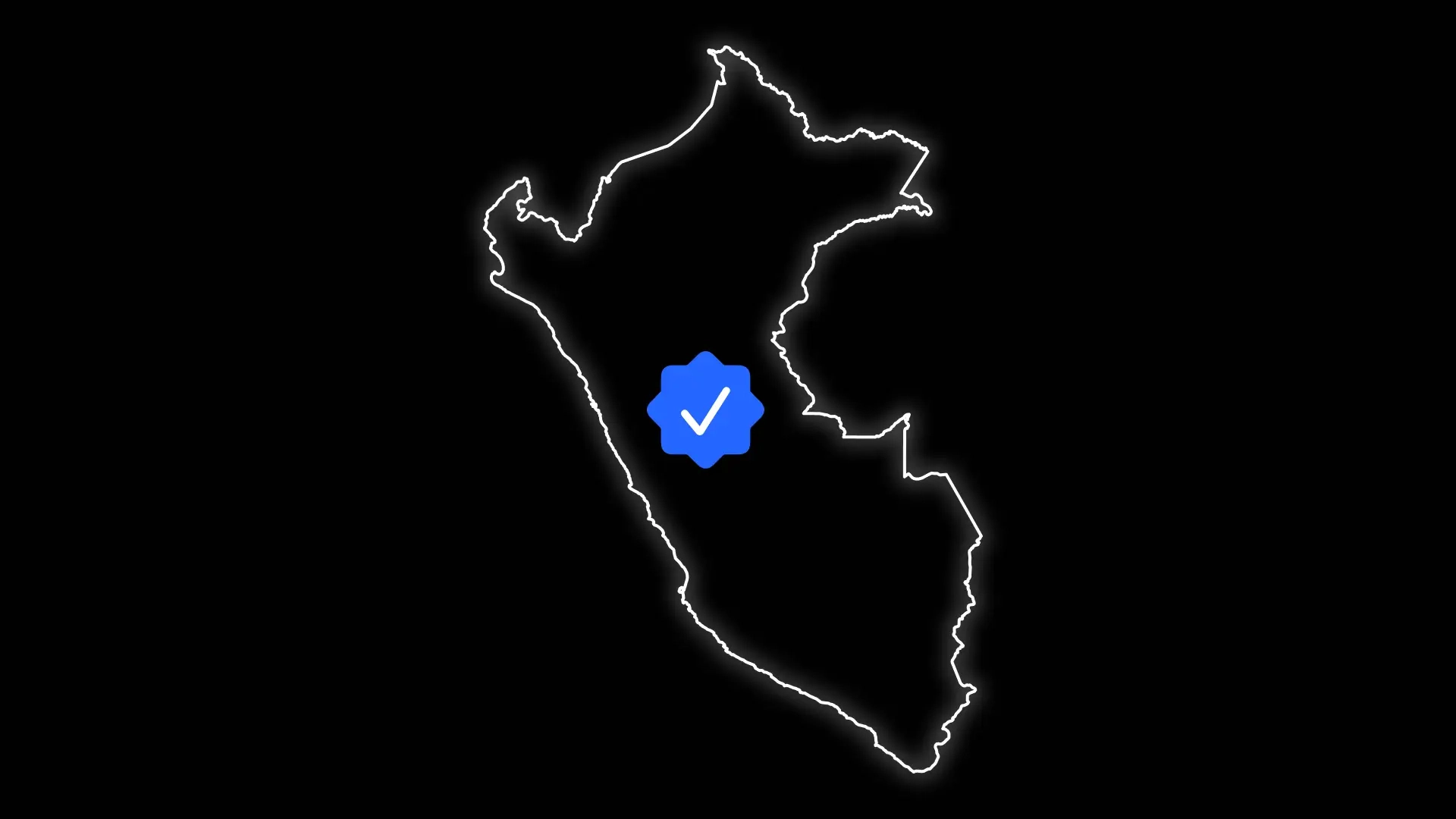
Identity Verification, KYC and AML Compliance in Peru
Key takeaways
Identity verification in Peru requires advanced technological solutions that overcome document fragmentation and comply with regulations such as Law 27693, which establishes strict requirements to prevent money laundering.
Emergency Decree No. 007-2020 promotes digital financial transformation, validating identities in digital environments and protecting personal data, which demands more sophisticated verification strategies.
The Peruvian National Identity Document (DNI) has become the cornerstone of citizen identification, incorporating biometric features, electronic chips, and anti-counterfeiting elements to ensure secure financial transactions.
Companies face unique challenges in identity verification, including the diversity of official documents, the need for digitization, and personal data protection, which requires comprehensive technological solutions like Didit.
With over 33 million inhabitants, Peru represents a market full of opportunities for companies that know how to navigate the complex financial regulatory landscape. In the Peruvian financial sector, success largely depends on mastering Know Your Customer (KYC) and Anti-Money Laundering (AML) regulations. The Peruvian legal framework, led by Law 27693, establishes strict requirements for identity verification in financial transactions, with significant penalties for non-compliance.
A thorough understanding of KYC and AML requirements in Peru is crucial to ensure that identity verification processes comply with the demanding local regulatory framework. Non-compliance can result in severe sanctions, which underscores the importance of implementing robust verification and compliance systems.

The legal framework of KYC and AML in Peru: regulatory requirements
The Peruvian KYC and AML legal framework acts as a protective barrier against illicit financial activities. Understanding these regulations is essential for operating safely in the Peruvian financial market.
Emergency Decree No. 007-2020: Digital Financial Transformation
Emergency Decree No. 007-2020 marked a milestone in Peruvian financial regulation. This decree established crucial measures to foster trust in digital financial services, promote sustainable growth of digital platforms, and strengthen personal data protection. Additionally, it introduced mechanisms for identity validation in digital environments, laying the foundation for a secure digital transformation in the Peruvian financial sector.
Law 27693: Creation of the Financial Intelligence Unit (UIF-Peru)
Law 27693, enacted in 2002, created the Financial Intelligence Unit (UIF-Peru), a central body in the fight against money laundering. This entity is responsible for receiving, analyzing, and transmitting information for the detection of money laundering and terrorist financing. The UIF-Peru plays a crucial role in supervising financial entities and establishing mechanisms for reporting suspicious transactions.
Transaction Reporting Regulations
Supreme Decree 018-2006-JUS establishes specific requirements for transaction reporting. Supervised entities must report operations that exceed certain thresholds:
- Transactions exceeding USD 10,000
- Transfers exceeding USD 2,500 in specific sectors
- Operations exceeding USD 50,000 across multiple offices
These regulations aim to create an effective surveillance system to detect and prevent suspicious financial activities.
Identity verification in Peru: a challenge for businesses
Identity verification in Peru presents unique challenges for KYC service providers. The growing digitization of the financial sector, combined with an evolving regulatory landscape, creates significant obstacles to ensuring accurate and secure identification.
Personal data protection is a critical factor in the Peruvian ecosystem. Although Peru does not have a specific data protection law comparable to Brazil's LGPD, for example, companies must be cautious in collecting and using personal information to comply with existing regulations and user privacy expectations.
Peru faces the challenge of not having a unified digital identity infrastructure. Unlike some neighboring countries that have advanced in this aspect, Peru still lacks a standardized digital identity system that allows for quick and universal verification. The National Identity Document (DNI) is the main means of identification, but the coexistence of other documents such as passports and driver's licenses in a fragmented system creates friction in identity verification processes.
Challenges in document verification in Peru
Document verification in Peru is marked by the complexity and diversity of the documentary ecosystem. Each official document has unique characteristics that require advanced technological solutions to ensure accurate authentication.
National Identity Document (DNI)
The DNI is the key document for citizen identification in Peru. Issued by the National Registry of Identification and Civil Status (RENIEC), it is valid for 8 years and includes advanced features such as biometric information and an electronic chip with digital certificates. This chip allows for the storage of highly sensitive personal data, making the DNI an essential tool not only for administrative procedures but also for secure financial transactions.
The DNI has also evolved to incorporate anti-counterfeiting elements such as complex holograms and specific zones for mechanical reading, making fraudulent manipulation difficult. However, its massive use poses logistical challenges for companies that need to process large volumes of verifications quickly.
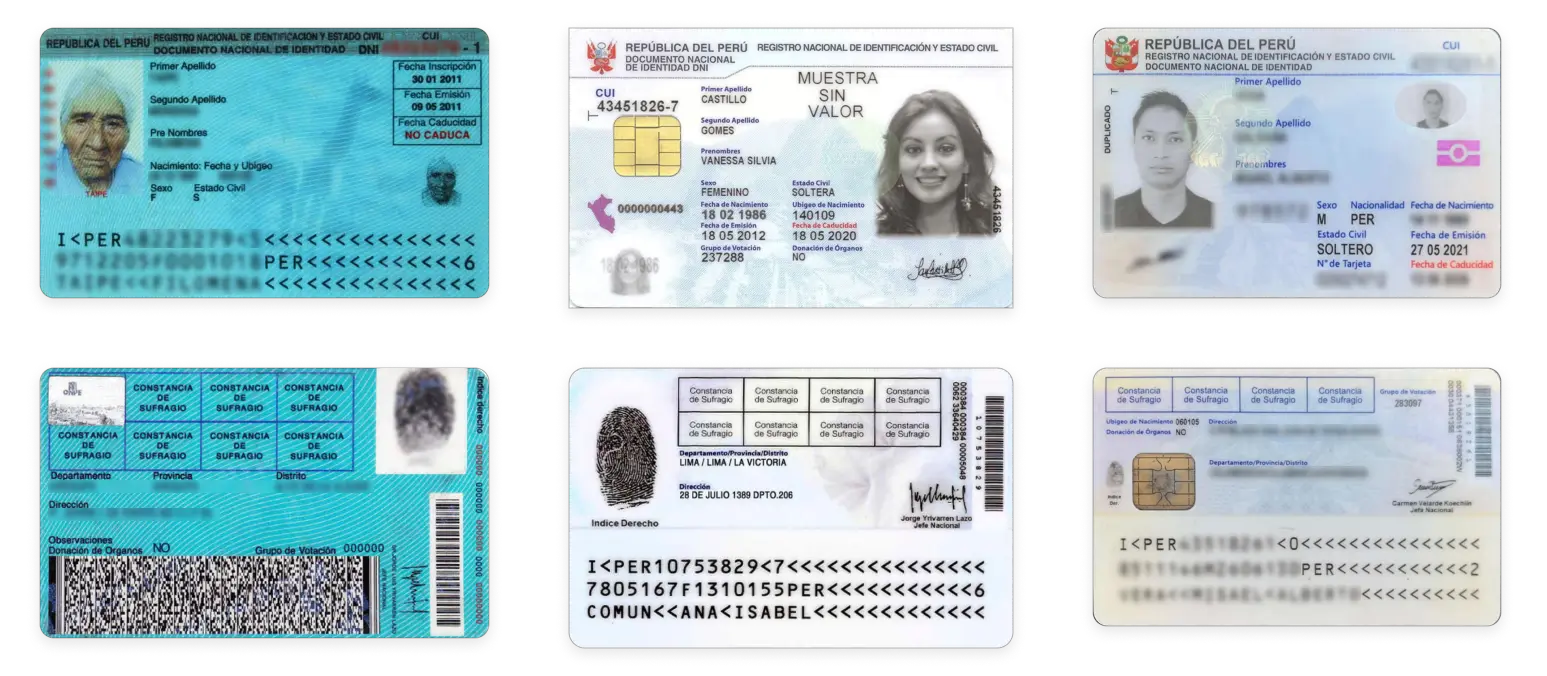
Peruvian passport: continuous modernization
The Peruvian passport has undergone multiple updates with the main objective of aligning with the strictest international standards in document security. The most recent versions include advanced elements such as machine-readable zones (MRZ), three-dimensional holograms, and RFID (Radio Frequency Identification) technology, which allows for storing additional information about the holder.
The inclusion of the RFID chip strengthens protection against counterfeiting by allowing faster and more secure verification at the international level. This technology also facilitates automatic crossing through electronically controlled borders, significantly improving the user experience without compromising security.
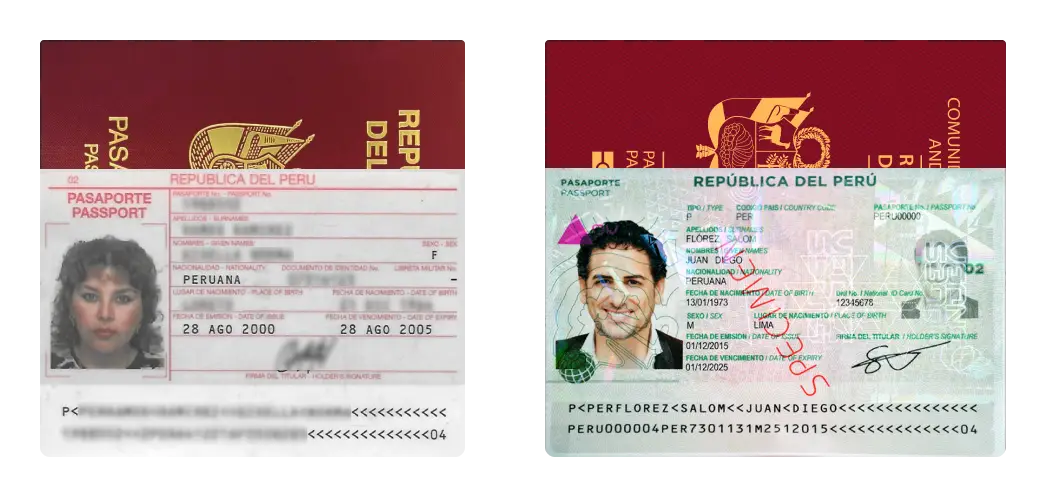
Driver's license: beyond vehicle permission
The Peruvian driver's license not only serves as legal authorization to drive vehicles but also functions as an official document accepted for identification purposes. Issued by the Ministry of Transport and Communications (MTC), its design incorporates multiple anti-counterfeiting layers such as unique QR codes, special holograms, and biometric features of the holder.
Additionally, Peruvian licenses are linked to centralized digital databases that allow for quick verification of their authenticity through automated systems. This makes this document a key tool for both authorities and companies that need to validate identities quickly.
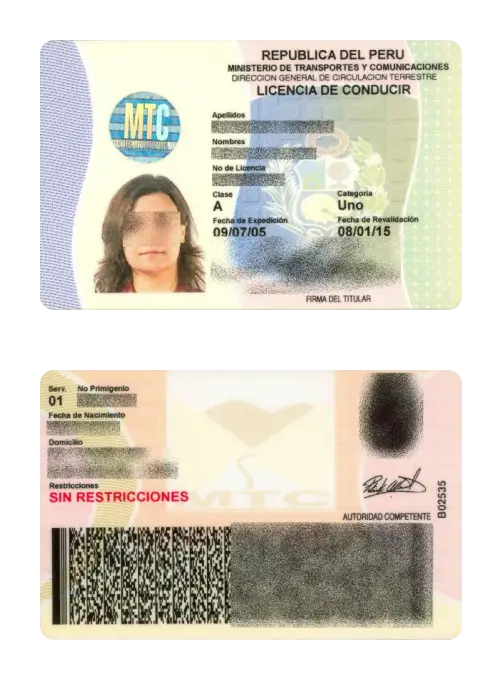
Foreign resident card: secure identification for foreign residents
The foreign resident card (residence permit) is issued by Peruvian Immigration to foreign citizens legally residing in the country. This document includes detailed information about the holder's immigration status along with anti-counterfeiting elements similar to those present in other official Peruvian documents. Its validity varies according to the specific type of permit granted to the foreign resident. The card is also linked to digital databases managed by Peruvian Immigration, which facilitates its verification by both immigration authorities and financial institutions or other private entities that need to confirm the identity of the holder.
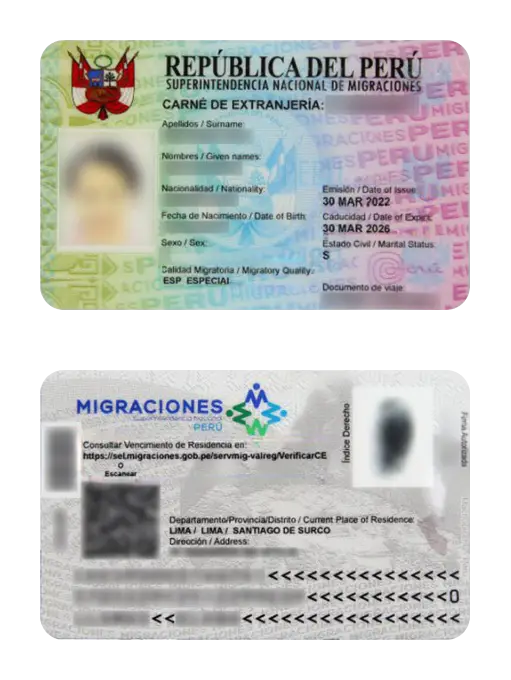
Additional challenges in document verification
Traditional systems face difficulties when it comes to mass or automated processing due to several reasons:
- Technological fragmentation: The coexistence of traditional physical documents (such as licenses or cards) along with more modern digital versions creates inconsistencies during automated processes.
- Structural variability: Each document type has different formats/structures which complicates their automatic recognition without specialized algorithms.
- Legal protection: Peruvian regulations demand high standards regarding the responsible/secure handling of sensitive personal data collected during these processes.
These barriers further highlight how advanced technological solutions like Didit can be crucial in offering innovative methods capable of not only meeting but exceeding local/global regulatory expectations within this highly particularized context of the current Peruvian market.
Didit: Transforming identity verification and KYC and AML compliance in Peru
The processes and regulatory compliance of KYC and AML in Peru represent complex challenges that can consume significant resources, increase operational risks, and hinder business growth. Didit emerges as an innovative solution to turn these challenges into opportunities for secure and efficient digital expansion.
Didit goes beyond being a simple KYC service provider. It positions itself as a strategic ally that democratizes access to advanced technologies in identity verification. By offering a free, unlimited, and forever service, Didit is redefining the rules of the game in digital identification in Peru, helping companies comply with local regulations while optimizing their internal processes.
Document verification
Didit's system uses advanced artificial intelligence algorithms that can validate more than 3,000 types of documents from over 220 countries and territories. This technology is capable of detecting inconsistencies and extracting information with unprecedented accuracy, adapting to the documentary diversity that characterizes the Peruvian market.
Peruvian documents, such as DNI, passports, driver's licenses, and residence permits, present unique characteristics that require specialized technological solutions to ensure accurate verification. Didit has developed tools that allow processing these documents quickly and securely, overcoming the obstacles imposed by documentary fragmentation.
Curious about how identity documents are verified? We tell you all about it in our blog article.
Facial recognition
Facial recognition is a key piece in modern identity verification processes. Didit implements customized artificial intelligence models that go beyond simple facial comparison. Its system includes a passive liveness test that ensures that the person being identified is really who they claim to be, thus avoiding fraud attempts through impersonation.
Furthermore, Didit has developed advanced technologies to detect fraudulent patterns specific to the Peruvian market, where document forgery attempts are a constant concern. This approach ensures that companies can fully trust the authenticity of verified identities.
AML Screening (optional)
In the Peruvian regulatory context, complying with AML regulations is essential to avoid significant sanctions. Didit offers a robust anti-money laundering screening system that performs real-time checks using more than 250 global datasets. This process covers over a million entities included in international watchlists, allowing companies to comply with local and international requirements.
The system is also designed to identify Politically Exposed Persons (PEPs) and other high-risk profiles, complying with global standards established by organizations such as the Financial Action Task Force (FATF).
What documentation does Didit verify in Peru?
Didit is prepared to handle the diverse official documentation used in Peru. Its system can accurately verify the following documents:
- National Identity Document (DNI): The central pillar of the Peruvian identification system.
- Peruvian passport: With multiple security layers and RFID technology.
- Driver's license: A key document not only for driving but also as an alternative means of identification.
- Foreign resident card or residence permit: Issued to foreign residents with detailed information about their immigration status.
For companies operating in Peru, implementing advanced technological solutions like those offered by Didit means not only complying with local regulatory requirements but also optimizing their internal processes. This translates into:
- Full compliance with local regulations on personal data protection and money laundering prevention.
- Significant reduction in operational costs, up to 90% compared to traditional methods.
- KYC processes completed in less than 30 seconds thanks to advanced automation.
In summary, Didit offers a comprehensive solution that not only solves current problems related to document verification and regulatory compliance in Peru but also transforms these challenges into competitive advantages for businesses. By adopting this innovative technology, organizations can operate with greater confidence and efficiency within the Peruvian market.
Ready to transform regulatory challenges into opportunities?
Identity Verification, KYC and AML Compliance in Peru

